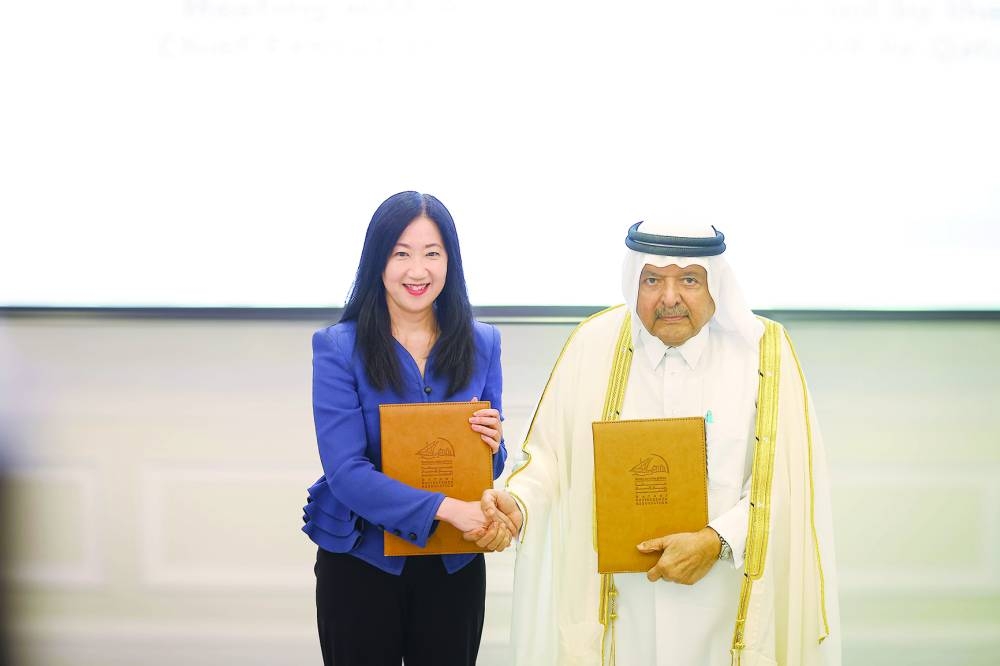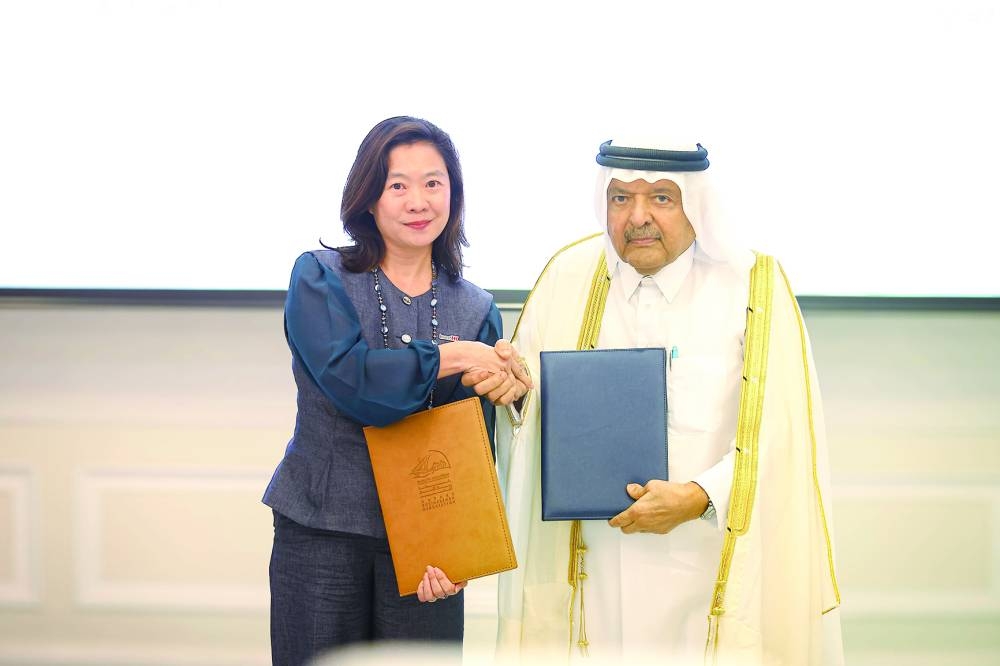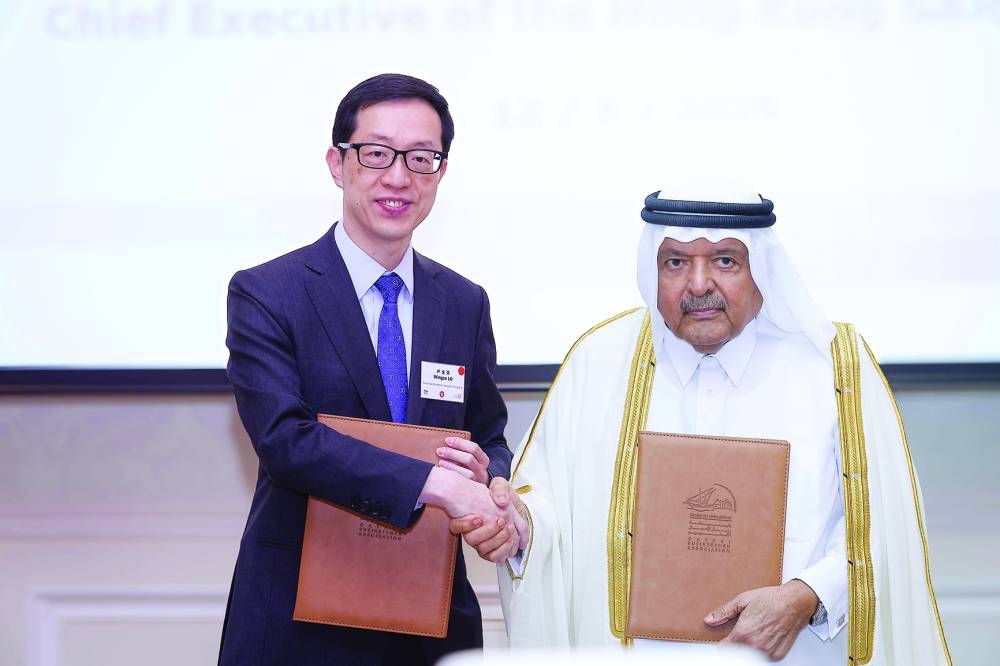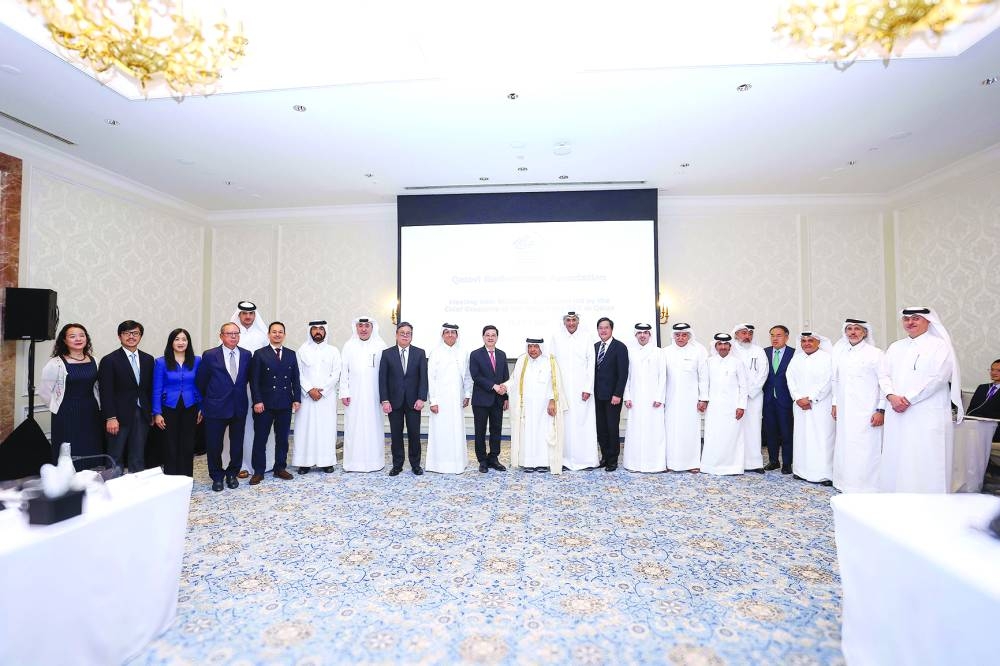The Qatari Businessmen Association (QBA) signed three memoranda of understanding (MoUs) on Monday with participating companies of a visiting delegation led by John Lee, the chief executive of the Hong Kong Special Administrative Region (HKSAR).
In the presence of Lee, QBA chairman HE Sheikh Faisal bin Qassim al-Thani exchanged three MoUs with Invest Hong Kong, the Hong Kong Trade and Development Council, and the Chinese Manufacturers’ Association of Hong Kong. The MoUs aim to enhance economic, trade, and investment co-operation between the two sides and facilitate investment processes in both directions.
The meeting with Lee and his delegation was attended by QBA chairman HE Sheikh Faisal bin Qassim al-Thani, QBA board members Sheikh Hamad bin Faisal al-Thani, Sheikh Nawaf Nasser bin Khaled al-Thani, and Saud al-Mana.
QBA members Omar Alfardan, Khalid al-Mannai, Salah al-Jaidah, Sheikh Mansour bin Jassim al-Thani, Nabil Abu Issa, Abdulsalam Abu Issa, Abdullah al-Kubaisi, Youssef al-Mahmoud, and Hakan Ozedmir, as well as Aamal Company CEO Rashid al-Mansoori and QBA deputy general manager Sarah Abdallah, also attended the meeting.
The meeting reviewed prospects for bilateral co-operation between Qatar and the HKSAR in areas like communications and information technology. Discussions included ways to strengthen partnerships in digital innovation, emerging technologies, and the exchange of expertise in developing digital infrastructure and smart government services.
It also covered opportunities to benefit from the pioneering experiences of Qatar and Hong Kong in areas like smart cities and digital governance. It explored potential collaborations between digital startups and government and private institutions in both countries to support future partnerships that enhance the digital economy and accelerate digital innovation.
During the meeting, Lee lauded Qatar’s robust economy, which he described as “the best in the Gulf in terms of growth.” He said Doha is seen as a “prominent” commercial and financial hub for business in the Middle East, adding that Hong Kong “is similarly a major business centre in Asia, equipped with numerous offices to help companies and investors benefit from the opportunities available.”
Lee invited QBA members to visit Hong Kong, saying companies there are looking to invest in vital sectors in Qatar, including infrastructure, information technology, fintech, and health and biotech technologies. He also added that Hong Kong is home to a large number of successful entrepreneurs in these sectors.
Similarly, Lee called for the strengthening and development of economic and financial ties to meet mutual aspirations. He affirmed that Hong Kong aims to become the world’s number one hub for family offices by 2027.
Sheikh Faisal said in recent years, Qatari companies have grown into major players in various sectors and have proven their capabilities through the successful implementation of domestic and international mega projects, citing the successful hosting of the 2022 FIFA World Cup in Qatar and the country’s participation in many projects across different continents.
He noted that QBA members are aware of the significant potential offered by Hong Kong’s economy in the fields of services and tourism, as well as its openness to the world’s largest markets, including China, one of Qatar’s biggest trading partners.
He emphasised that QBA members have diverse investments across various continents and sectors, including tourism, finance, agriculture, and retail, and are willing to explore investment opportunities with Hong Kong’s business community and major companies and work together in both countries.
Sheikh Hamad said Qatar, through its 2025–2030 National Strategy, is shifting toward a knowledge-based economy that aligns with Hong Kong’s key sectors like financial services, artificial intelligence, logistics, and tourism. He said this creates diverse opportunities for bilateral cooperation, especially with the significant tax and legislative incentives Qatar offers to foreign investors.
He noted that QBA will work with Invest Hong Kong, the Hong Kong Trade and Development Council, and the Chinese Manufacturers’ Association of Hong Kong to identify specific economic sectors for joint efforts between QBA and its Hong Kong counterparts to strengthens trade and economic ties, adding that QBA is ready to visit Hong Kong to explore available investment opportunities.
Sheikh Nawaf said Hong Kong has a special programme aimed at attracting family-owned businesses, especially from Gulf countries. He said Hong Kong is also working on easing capital investment entry requirements to support its efforts in attracting family offices and strengthening its position as a global wealth hub. He inquired about the features of this programme and whether it has succeeded in attracting Gulf-based family businesses in recent times.
Christopher Hui, Hong Kong’s secretary for Financial Services and Treasury, said there are more than 2,700 family offices in Hong Kong, including 200 large ones recently established. He added that the country is encouraging these measures to attract more investors.
“This step could be added to the tax exemption system for family offices, thereby boosting the development of the family office sector in Hong Kong,” he said, adding that the Hong Kong government offers residency to individuals who invest 30mn Hong Kong dollars (approximately $3.9mn), which represents the city’s latest step in attracting wealth.

QBA chairman HE Sheikh Faisal bin Qassim al-Thani exchanged three MoUs with Invest Hong Kong, the Hong Kong Trade and Development Council, and the Chinese Manufacturers’ Association of Hong Kong.



QBA chairman HE Sheikh Faisal bin Qassim al-Thani and shaking hands with John Lee, the chief executive of the Hong Kong Special Administrative Region (HKSAR), in the presence of QBA officials and members, as well as Lee's delegation.
